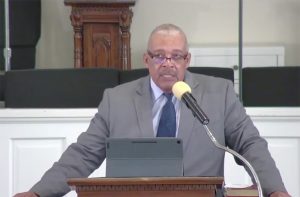“Greece: Crucible of Civilization”
This three part PBS “Empires” documentary (consolidated into one video here) narrated by Liam Neeson details the rise of Greece from being a collection of small independent city-states in 570 BC to becoming the world’s first democracy and a superpower in the Mediterranean, followed by its quick descent into chaotic mob rule by around 400 BC.
The documentary explains the innovative concepts of Democratic government that were experimented with and applied in ancient Greece, as well as the serious problems that arose due to its configuration essentially being simply “mob rule.” [Note: The first truly effective Democratic government was not established until thousands of years later with the founding of the United States. The United States is technically a “Republic” and not a “Democracy,” see this interesting video that explains the differences between the two systems.]
Following are points from the video:
Part I
— In 570 BC, Cleisthenes had been born into one of the wealthiest aristocrat families in Greece that had control over the commoners of the small town of Athens. At the time, the current region of Greece was divided into many small city-states. The nearby city of Corinth dominated Greek trade on the Mediterranean Sea, and the city-state of Sparta had strong military power where they conquered adjacent populations of Greece and turned them into to a slave class that they ruled with an iron fist.
— Peisistratos took control of Athens in a “benevolent tyranny” in 546 BC, turning to the common Athenian citizens for support, which undermined the previous political hierarchy that had existed for centuries. Peisistratos reduced taxes and offered free loans for people to build their farms, which vastly increased the amount of crops that were grown such as olives, and the crops were exported all over the Mediterranean which increased the wealth and prosperity of Athens.
— When Peisistratos died in 527 BC, his son Hippias took over, but he did not rule fairly as his father had, and eventually he slid into madness and paranoia, which led to him stripping away the commoner’s freedoms that were established under his father.
— The Olympic games in ancient Greece are explained, where as many as forty thousand spectators watched the competitions.
— Cleisthenes overthrew Hiipias in 510 BC and became very powerful, but many conspired against him once he was in power, including Isagoras who turned to outside Athens to recruit the Spartans to back up his bid for power in a successful coup against Cleisthenes.
— Once Isagoras was in power, he ruled as a despotic dictator backed up by the fierce Spartans. In 508 BC, the people of Athens rose up against him and his troops and forced him to surrender, which was the first time in recorded history when the people rose up against their ruler and seized control.
— Cleisthenes was then recalled from exile and asked to build a government by the people, and he designed the form of governance of rule by the people known as “democracy.”
Part II
— Persia was the most powerful region in the world at the time and it attacked Athens in 490 BC, outnumbering the fighting people of Athens two to one. The attack prompted a desperate run by Pheidippides of 140 miles in just two days to the Spartans for ask for help, which they refused. However, the Athenians won anyway despite being outnumbered, killing 6,000 Persians in a single day. Pheidippides’ run was the modern inspiration for “Marathon” races.
— The Athenian General Themistocles fought on the battlefield of the Persian attack, and he convinced Greece to establish the creation of a large naval force of battering ram ships that were built just in time to defend against another much larger Persian attack in 480 BC, where the Greeks demolished the Persian fleet of two hundred ships in the Straits of Salamis, breaking Persia’s navy and defeating the strongest empire at the time, giving Athens naval superiority in the Mediterranean.
— Athens then began to grow into a diverse trading superpower in the Mediterranean, and it formed an alliance of Greek states called the Delian League, with Athens being the leader.
— A system was in place to “ostracize” members of government, and surprisingly Themistocles was actually ostracized by the flawed system, despite all that he had done for the country.
— The Athenians then elected Pericles, who directed the massive construction of the grand Parthenon building that was built on the ruins of the Persian invasion 20 years earlier, and the structure was completed in only 15 years.
— The people in the city of Athens at the time excelled in achievements of science, art, and culture, which would help to shape western civilization.
— Pericles was married to a woman named Aspasia who was essentially a prostitute, and Pericles was said to have treated her as an equal.
Part III
— In 431 BC, the city-state of Athens was now the greatest power in the Mediterranean under the leadership of Pericles, located in the center of a trading route that stretched from Britain in the west to India in the east.
— In parliament, Pericles presented a plan to use the navy to help to vanquish the militant Sparta in southern Greece in order to make Athens the undisputed leader in the Mediterranean.
— The documentary mentions the first great Greek Scientist Thales who discovered how to navigate using the stars as a guide, with him being a part of a group of scientists who measured the circumference of the Earth while others thought it was flat, and they devised steam engines, water pumps, and suspension bridges.
— Socrates was a genius unkempt citizen of Athens who pioneered the study of philosophy using logic and reason, and he always conversed with many people in the city streets.
— During the military campaign against the Spartans, plague broke out in the city that killed over 1/3 of its population as well as Pericles who was crucial in leading that military campaign, which destroyed the strategy to overtake the Spartans.
— A flood of corruption and vice followed the death of Pericles, with many people scrambling to claim the top government position and doing anything to appease the will of the people if it gave them power; simply by following the prejudices and the passions of the masses in order to gain support.
— Athens was then ruled by self-interested despots, and the war against Sparta dragged on for a decade with neither side being able to win.
— In 416 BC, Athens set out on a Naval expedition to attack Sicily, but due to the commanders arguing with each other about strategy, they were pinned down upon attempting the attack and the entire military of Athens was wiped out by the Sicilians, with over 50,000 men being killed or taken prisoner, and with two entire fleets of ships being destoyed.
— The Persians then saw the opportunity for revenge for their defeat 50 years previously, and they allied themselves with the Spartans and gave the Spartans a naval fleet so that they could blockage the Athenian harbors, which stopped its imports and exports and caused the Athenians to starve in the streets.
— In 404 BC, Athens finally had to surrender to Sparta, who insisted that the walls of the city were to be town down and their remaining fleet was to be destroyed.
— The Athenians were then humiliated by the fall of their civilization, and they convinced themselves that Socrates was an enemy of their state because of his decades of outspoken criticism of Athen’s faults, which led to him being arrested under the command of the corrupt assembly and condemned to death.
— Athens was never again a great imperial power in Greece, but it continued to create many scientific and cultural advancements.
Article Tree
| A Summary of the History of the World, in Videos |
| THE GREEK ERA |
| Video: “Greece: Crucible of Civilization” |



